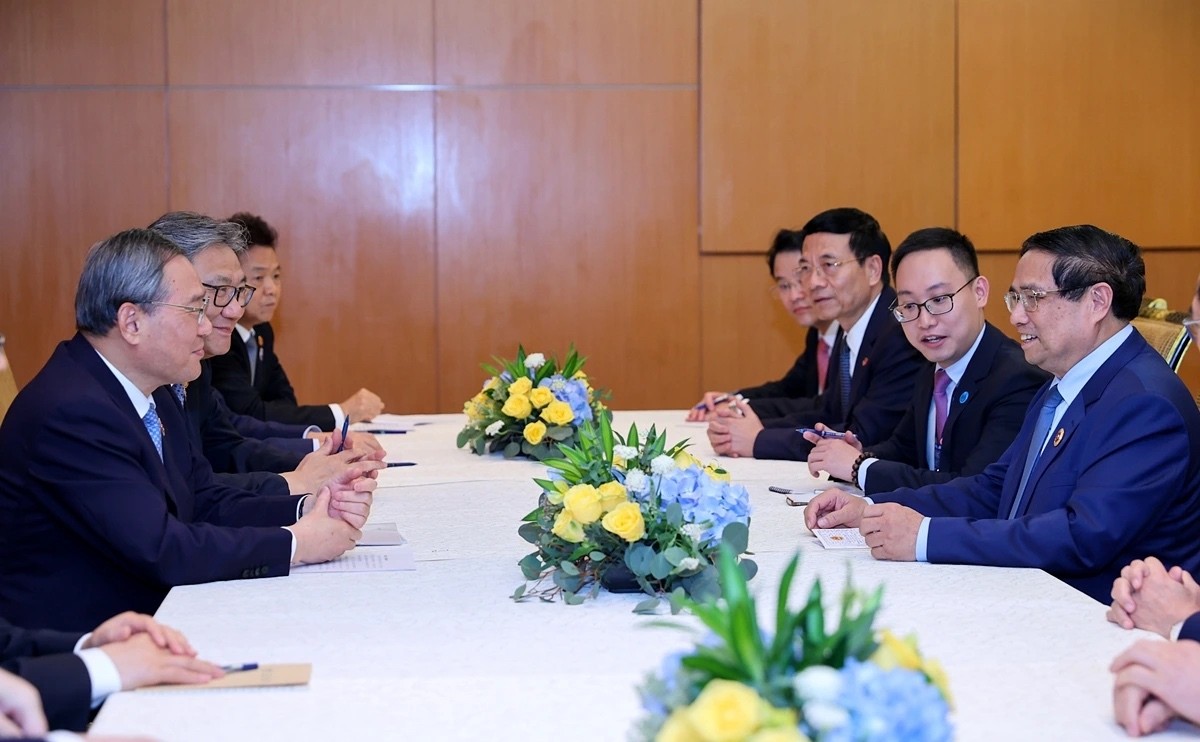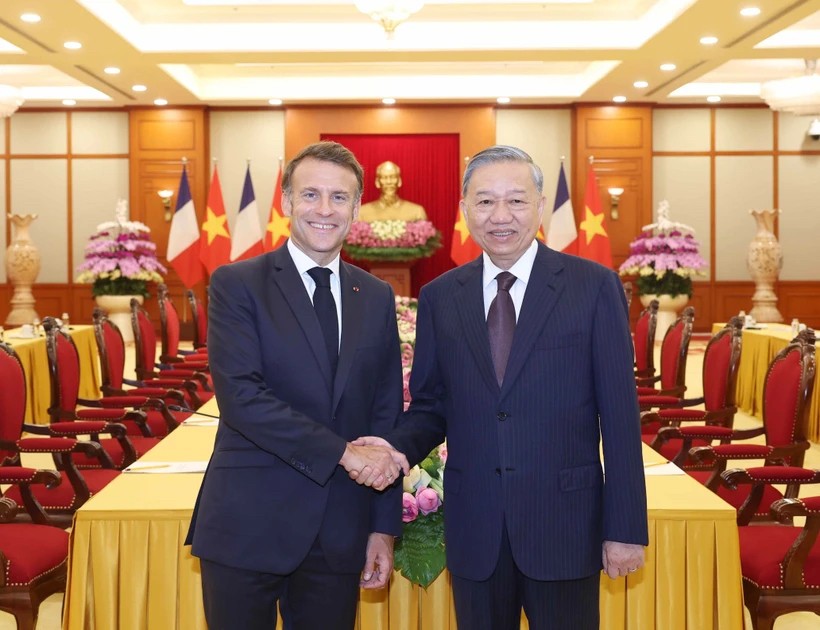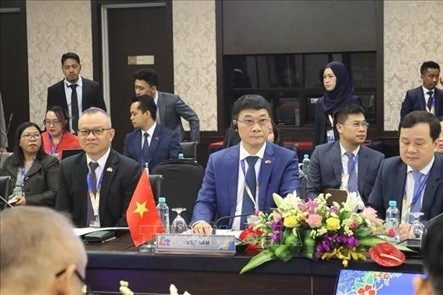Vietnam’s political renewal under the impact of globalization
In Vietnam, the renewal process is occurring under the impact of the trend of globalization. It brings our country many opportunities and challenges. Times Online respectfully shares an essay clarifying the contents with readers.
The achievements during nearly 30 years of renewal process (1986-2012) have confirmed the accuracy of the road that Vietnam has chosen. That is the road to socialism, which is the consistent road for comprehensive renewal by conducting the economic renewal to select and gradually renew the political issues. The step suits the argument about the relationship between economic renewal and political renewal and about the political renewal in particular. In fact, it also suits the development trend of the era.
Political renewal is identified by the Party to consistently follow socialism targets, continue the way to bypass the stage of capitalist development and reach socialism; political renewal does not mean to change or quit socialism. The nature of political renewal is to renew the political thought about socialism and the road to socialism; renew mechanism and policies with a key to address reasonably and harmonise the relationship of interests; renew the organising structure and operating mechanism of the political system to build up stronger and stronger socialism, carry out well socialist democracy to fully promote people’s right of mastery during the process to develop the socialist-oriented law-governed State and boost economic development – under the leadership of the Party. The main content of political renewal in our country is to renew the theoretical thought and practical activities about socialism and the road to socialism, with a key to renew the political thought and the political system.
Since 1986, political renewal in Vietnam, apart from the factors relating to the level of domestic economic, political, cultural, social, security and defence development, is under increasing impact of world changing trends, including globalization.
It leaves two-sided impacts to political renewal in our country. On the one hand, globalization brings about opportunities for Vietnam to actively conduct political renewal and deeply integrate into the world economic, political, cultural and social life.
In fact, the trend of globalization requires the Communist Party of Vietnam to continuously renew political thought to complete the theories orienting the making of accurate strategies and policies in reality. This is the requirement to seriously and promptly conduct theoretical work, have accurate and timely awareness and assessment on the issues of the era, the tendencies of the world, thus accelerating international integration on the basis on sovereignty independence, territorial integrity and under the unified leadership of the Communist Party of Vietnam. This is the requirement of accurate and full awareness of the major relationships that need addressing well in the renewal process to socialism in our country under the impact of globalization, including the relationship between renewal, stability and development; the relationship between economic renewal and political renewal; the relationship between market economy and socialist orientation; the relationship between the development of productive forces and the gradual completion of appropriate productive relations; the relationship between economic growth and cultural development, realization of social progress and equality; the relationship between the building of socialism and the protection of the Vietnamese socialist fatherland; the relationship between independence, self-reliance and international integration; the relationship between Party leadership, State management and people’s mastery. Globalization urges the Communist Party of Vietnam to have renewal in thought of awareness on moving forces which need promoting in the current strong globalization, that is the harmonious combination among interests; national great unity on the foundation of the union of the working class with the farming class and the intellectual circle under the leadership of the Communist Party of Vietnam; the completion of socialist culture, promoting the role of human resources in building socialism.
Therefore, in its thought, the Party has a profound awareness that integration is a basic and indispensable road for national development in the context of globalization. As globalization takes place in all areas of social life, our Party masters a clear awareness that integration is not only actively and proactively integrating into the world economy, but also expanding international cooperation in other areas; participating in political cooperation mechanisms, bilateral and multilateral security; renewing and increasing the introduction, dissemination of culture, literature, arts, Vietnamese country and people with the world.
In addition, our Party stresses economic renewal, thus improving and increasing people’s living standards, creating active stability to conduct political system firmly and seriously. From that, Vietnam, under the leadership of the Communist Party, shifted from the development of concentrated planned economy into multi-sectoral commodity economy and into socialist-oriented market economy, suiting the tendency of development of the world economy; bringing about a new face for the country’s economy, reinforcing people’s trust in the regime, and increasing the country’s competitiveness on the international arena. In fact, many laws have been issued, including Investment Law, Bidding Law, Enterprise Law, Labour Code, Aviation Law, Maritime Law, creating an increasingly synchronous and completive legal framework for the development of the market economy, for international integration, for the stability, development and equal competitiveness among economic sectors. Vietnam expands trade relations; imports and exports goods and services; attracts foreign direct investment; signs bilateral economic agreements with foreign countries; participates in and is a member of international and regional economic organizations such as the World Bank (WB), the International Monetary Fund (IMF), the Asian Development Bank (ADB); joins in regional groups such as Association of Southeast Asian Nations (ASEAN), Asia-Pacific Economic Cooperation (APEC), the Asia-Europe Meeting (ASEM); and becomes a member of the World Trade Organization (WTO).
However, globalization, with the corner of capitalism, places Vietnam’s politics in front of major challenges, including the risk of being off socialism, the risk of “peaceful evolution”, “self-movements” in the Party, the risk of being backward in economic development, the risk of being not able to control and deal with a series of arising social problems in the complex domestic and international situation.
Throughout the years that Vietnam has conducted renewal process, imperial forces have continuously sought every way and by every road to destroy the Party leadership; disseminated among the people about the pre-eminence and progress of so-called political pluralism and opposite multiparty. Besides, by many ways, hostile and reactionary forces have bribed Communist Party members and pre-eminent public to disorder the political and social life, making the public lose the trust in the regime and fading communist ideal. The forces have found ways to distort the political and social life in Vietnam, taken advantage of the high development of modern technology to exaggerate distorted truth on the international arena, turning it into a tool to attack the Communist Party and obstruct the road to socialism in Vietnam.
With its wrong side, globalization, has left negative influence on the State of Vietnam, causing a risk of being put off from the socialist regime. Relying on economic, scientific and technological strength, developed capitalist countries have cornered global economic and financial organizations such as IMF, WB, WTO, imposing unequal operating regulations and methods, causing more and more serious damage to and threatening Vietnam’s national sovereignty. Earlier, the national sovereignty was complete. In globalization, the national sovereignty is losing the complete characteristic. Vietnam does not only face the risk of being off in political road but also the risk of being in threat of its territorial sovereignty being violated when, together with the trend of globalization, there is the debut and increasingly important role of such organizations as the United Nations, international law, international military organizations, international commercial and financial organizations; when warlike forces, regardless of tricks, destroys our regime, intervene our internal work and sovereignty. Therefore, Vietnam’s socialist-oriented politics and independence and self-reliance face more and more risks and stand in front of perse challenges. Meanwhile, in terms of military and economic factors, Vietnam is not as advantageous as countries in the region and in the world. Together with it, hostile forces and exiled reactionary forces always seek ways and aid to realise their schemes to destroy our regime, destroy the only leadership of the Communist Party of Vietnam. They make every effort to wear the masks of “freedom”, “human rights”, “religions, beliefs”, “groups”... to excite, separate and break away the people; intensively realise peaceful evolution strategy and violent disturbances across the country.
The influence of globalization towards Vietnam’s political renewal has raised a number of issues, including Vietnam’s lower economic position than regional and international countries; the challenges in obeying “rules of the game” in regional and world organizations such as ASEAN and WTO; the pressure of international competition; the expansion and pressure from monopoly trans-national organizations; and the poor awareness in the contents, steps and roadmap for international integration, for political renewal.
The adequate awareness on the negative influence of globalization on Vietnam’s political renewal helps Communist Party of Vietnam make guidelines to lead the State in effectively carrying out policies for national comprehensive development. Some basic viewpoints set by the Party are listed as follows:
- Consistently carrying out comprehensive renewal in accordance with Marxism, Leninism and Ho Chi Minh’s thought for the target of rich people, strong nation, democratic, equitable and advanced society;
- Ensuring that political renewal does not mean replacing political institution but being aware of and building a really democratic political regime, a socialist law-regulated State led by the Communist Party;
- Strictly combining political renewal with economic, social, cultural and defence renewal;
- Political renewal is the common responsibility of the whole political system, with the Party leadership being a decisive factor.
Thence, globalization does not only bring opportunities for Vietnam but also challenges. The influence of globalization raises an issue of having adequate awareness on political renewal in Vietnam; renewing on basis of ensuring principles; having good forecasts over the tendency of the influence of globalization towards political renewal; and consistently struggling with hostile forces’ “peaceful evolution” scheme and “self-movements” in the Party.
In his book “The Challenge of reform in Indochina”, from the early 1990s, author Ljunggren forecast that Vietnam would obtain economic growth rate sufficient for the State to increase its key role in developing the material and social infrastructure and would accelerate renewal process. He also stressed that the renewal process did not only mean economic renewal, but also increased political renewal.
In the current context, globalization, as an objective tendency, opens up many opportunities for Vietnam. On the other hand, it places Vietnam in perse difficulties and challenges. Continuing renewal for adaptation is a prompt and accurate selection. The process requires intelligent and stable leadership of the Communist Party, of the State and its responsibility to the whole Vietnamese nation./.
( Compiled by VNF )
Recommended
 National
National
Vietnam News Today (Jun. 2): Vietnamese Trade Mission Sounds Out Business Opportunities in United States
 National
National
Vietnam News Today (Jun. 1): Vietnamese, Japanese Firms Foster Partnership
 National
National
Vietnam News Today (May 31): Vietnam Strongly Supports Laos’s National Development
 National
National
Vietnam News Today (May 30): Vietnam, Venezuela Reinforce Ties Through People-to-people Diplomacy
 National
National
Vietnam News Today (May 29): Vietnam and Hungary to Expand Cooperation into New Areas
 National
National
Vietnam News Today (May 28): Vietnam and China Discuss Strategic Cooperation Orientations
 National
National
Vietnam News Today (May 27): Vietnam Treasures Multifaceted Collaboration with France
 National
National
